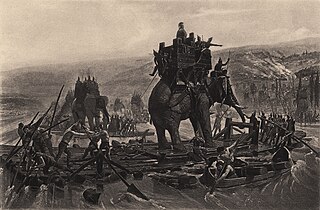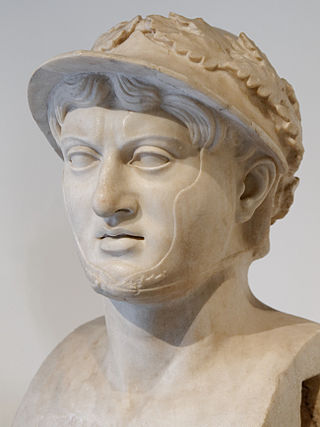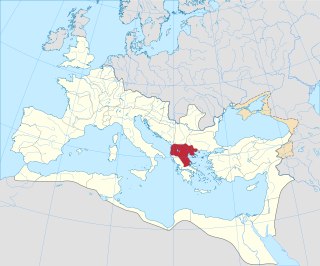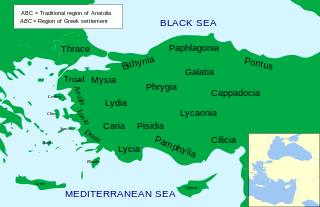The Roman-Greek wars were a series of conflicts between the Roman Republic and Greek kingdoms and city-states.
The list includes:

The 1st century BC, also known as the last century BC and the last century BCE, started on the first day of 100 BC and ended on the last day of 1 BC. The AD/BC notation does not use a year zero; however, astronomical year numbering does use a zero, as well as a minus sign, so "2 BC" is equal to "year –1". 1st century AD follows.

The 2nd century BC started the first day of 200 BC and ended the last day of 101 BC. It is considered part of the Classical era, although depending on the region being studied, other terms may be more suitable. It is also considered to be the end of the Axial Age. In the context of the Eastern Mediterranean, it is the mid-point of the Hellenistic period.

The 3rd century BC started the first day of 300 BC and ended the last day of 201 BC. It is considered part of the Classical Era, epoch, or historical period.
This article concerns the period 279 BC – 270 BC.

Philip V was king of the ancient Greek kingdom of Macedon from 221 to 179 BC. Philip's reign was principally marked by the Social War in Greece and a struggle with the emerging power of the Roman Republic. He would lead Macedon against Rome in the First and Second Macedonian Wars. While he lost the latter, Philip later allied with Rome against Antiochus III in the Roman-Seleucid War. He died in 179 BC from illness after efforts to recover the military and economic condition of Macedonia and passed the throne onto his elder son, Perseus of Macedon.

Pyrrhus was a Greek king and statesman of the Hellenistic period. He was king of the Molossians, of the royal Aeacid house, and later he became king of Epirus. He was one of the strongest opponents of early Rome, and had been regarded as one of the greatest generals of antiquity. Several of his victorious battles caused him unacceptably heavy losses, from which the term "Pyrrhic victory" was coined.

The Fourth Macedonian War was fought between Macedon, led by the pretender Andriscus, and the Roman Republic. It was the last of the Macedonian Wars, and was the last war to seriously threaten Roman control of Greece until the First Mithridatic War sixty years later.

The Roman provinces were the administrative regions of Ancient Rome outside Roman Italy that were controlled by the Romans under the Roman Republic and later the Roman Empire. Each province was ruled by a Roman appointed as governor.

The Kingdom of Pergamon, Pergamene Kingdom, or Attalid kingdom was a Greek state during the Hellenistic period that ruled much of the Western part of Asia Minor from its capital city of Pergamon. It was ruled by the Attalid dynasty.

In classical antiquity, the Hellenistic period covers the time in Mediterranean history after Classical Greece, between the death of Alexander the Great in 323 BC and the death of Cleopatra VII in 30 BC, which was followed by the ascendancy of the Roman Empire, as signified by the Battle of Actium in 31 BC and the Roman conquest of Ptolemaic Egypt the following year, which eliminated the last major Hellenistic kingdom. Its name stems from the Ancient Greek word Hellas, which was gradually recognized as the name for Greece, from which the early modern 19th century historiographical term Hellenistic was derived. The term "Hellenistic" is to be distinguished from "Hellenic" in that the latter refers to Greece itself, while the former encompasses all the ancient territories of the period which had come under significant Greek influence, in particular the Hellenized Middle East, after the conquests of Alexander the Great.

The Macedonian Wars were a series of conflicts fought by the Roman Republic and its Greek allies in the eastern Mediterranean against several different major Greek kingdoms. They resulted in Roman control or influence over Greece and the rest of the eastern Mediterranean basin, in addition to their hegemony in the western Mediterranean after the Punic Wars. Traditionally, the "Macedonian Wars" include the four wars with Macedonia, in addition to one war with the Seleucid Empire, and a final minor war with the Achaean League. The most significant war was fought with the Seleucid Empire, while the war with Macedonia was the second, and both of these wars effectively marked the end of these empires as major world powers, even though neither of them led immediately to overt Roman domination. Four separate wars were fought against the weaker power, Macedonia, due to its geographic proximity to Rome, though the last two of these wars were against haphazard insurrections rather than powerful armies. Roman influence gradually dissolved Macedonian independence and digested it into what was becoming a leading empire. The outcome of the war with the now-deteriorating Seleucid Empire was ultimately fatal to it as well, though the growing influence of Parthia and Pontus prevented any additional conflicts between it and Rome.

The Mithridatic Wars were three conflicts fought by Rome against the Kingdom of Pontus and its allies between 88 – 63 BC. They are named after Mithridates VI, the King of Pontus during the course of the wars who initiated the hostilities after annexing the Roman province of Asia into its Pontic Empire and committing massacres against the Roman inhabitants there. Mithridates was able to organise revolts against advancing Roman troops and play off the political factions of the optimates and populares against one another in the Roman civil wars. Nevertheless, the first war ended with a Roman victory, confirmed by the Treaty of Dardanos signed by Sulla and Mithridates. Greece was restored to Roman rule and Pontus was expected to restore the status quo ante bellum in Asia Minor.

Asia was a Roman province covering most of western Anatolia, which was created following the Roman Republic's annexation of the Attalid Kingdom in 133 BC. After the establishment of the Roman Empire by Augustus, it was the most prestigious senatorial province and was governed by a proconsul. That arrangement endured until the province was subdivided in the fourth century AD.

Macedonia was a province of ancient Rome, encompassing the territory of the former Antigonid Kingdom of Macedonia, which had been conquered by the Roman Republic in 168 BC at the conclusion of the Third Macedonian War. The province was created in 146 BC, after the Roman general Quintus Caecilius Metellus defeated Andriscus of Macedon, the last self-styled King of Macedonia in the Fourth Macedonian War. The province incorporated the former Kingdom of Macedonia with the addition of Epirus, Thessaly, and parts of Illyria, Paeonia and Thrace.
Archelaus was a prominent Greek general who served under King Mithridates VI of Pontus in northern Anatolia and was also his favorite general.

Cappadocia was a province of the Roman Empire in Anatolia, with its capital at Caesarea. It was established in 17 AD by the Emperor Tiberius, following the death of Cappadocia's last king, Archelaus.

Bithynia and Pontus was the name of a province of the Roman Empire on the Black Sea coast of Anatolia. It was formed during the late Roman Republic by the amalgamation of the former kingdoms of Bithynia and Pontus. The amalgamation was part of a wider conquest of Anatolia and its reduction to Roman provinces.

Classical Anatolia is Anatolia during classical antiquity. Early in that period, Anatolia was divided into several Iron Age kingdoms, most notably Lydia in the west, Phrygia in the center and Urartu in the east. Anatolia fell under Achaemenid Persian rule c. 550 BC. In the aftermath of the Greco-Persian Wars, all of Anatolia remained under Persian control except for the Aegean coast, which was incorporated in the Delian League in the 470s BC. Alexander the Great finally wrested control of the whole region from Persia in the 330s BC. After Alexander's death, his conquests were split amongst several of his trusted generals, but were under constant threat of invasion from both the Gauls and other powerful rulers in Pergamon, Pontus, and Egypt.

The Battle of Histria, c. 62–61 B.C., was fought between the Bastarnae peoples of Scythia Minor and the Roman Consul Gaius Antonius Hybrida. The Bastarnae emerged victorious from the battle after successfully launching a surprise attack on the Roman troops; Hybrida escaped alongside his cavalry forces leaving behind the infantry to be massacred by the Bastarnian-Scythian attackers.